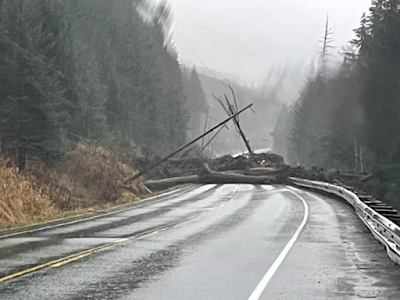Four people have now been confirmed dead and two remain missing following a landslide on Wrangell Island, Alaska, on Monday 20 November 2023. The landslide, which is described as having been 137 m wide, brought several hundred tons of waterlogged soil and timber down onto the Zimovia Highway, south of the town of Wrangell, blocking the road and destroying three homes, one of which was unoccupied. One of the occupants of the homes, Christina Florschutz, survived the event with minor injuries, though her husband, Otto Florschutz, is still missing, as is one of their neighbours, 12-year-old Derek Heller. Derek's sixteen-year-old sister, Mara, was found dead in the immediate aftermath of the event, while the bodies of his parents, Timothy Heller, 44, and Beth Heller, 36, were found the next day. The body of eleven-year-old Kara Heller was located on Saturday 25 November by Alaska State Troopers with the aid of rescue Dogs.
The landslide came amid an early winter storm, which brought 50 mm of rain to the island in a few hours and caused damage along a wide stretch of the Southeast Alaskan coast, although no further fatalities. Landslides are a common problem after severe weather events, as excess pore water pressure can overcome cohesion in soil and sediments, allowing them to flow like liquids. Approximately 90% of all landslides are caused by heavy rainfall.
Winter storms in Alaska are typically the remnants of Pacific tropical cyclones. These storms have become more hazardous in recent years due to the warming climate, which has both led to sea ice forming later, removing a protective barrier from coastal regions, and a combination of the ground freezing later and precipitation falling as rain rather than snow, which leads to more flooding and landslide events.
See also...
Follow Sciency Thoughts on Facebook.
Follow Sciency Thoughts on Twitter.








